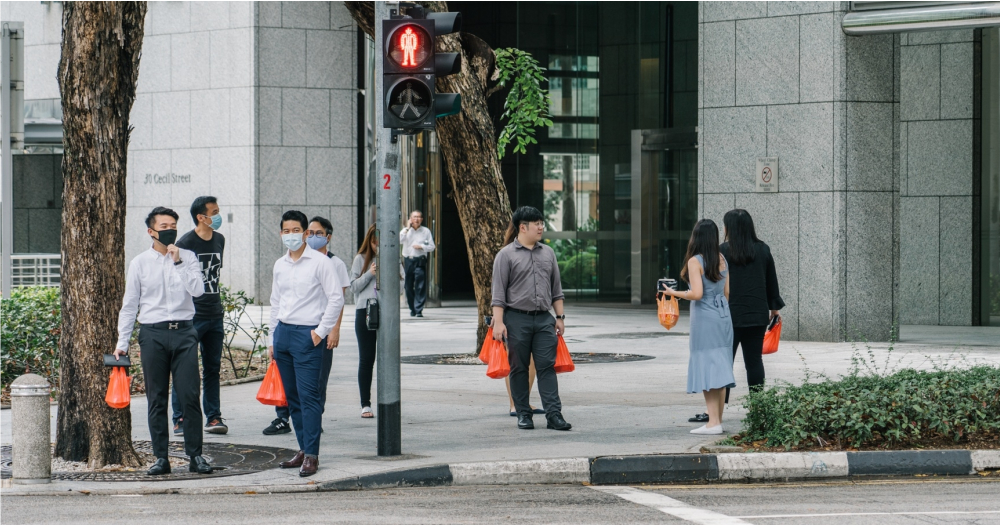Follow us on Telegram for the latest updates: https://t.me/mothershipsg
The new wave of Covid-19 infections in Singapore is peaking or approaching its peak, said Health Minister Ong Ye Kung in parliament on Tuesday (July 5).
Ong was responding to a parliamentary question from West Coast GRC MP Ang Wei Neng about the Government's response in light of the recent rise of Covid-19 infections in Singapore.
"Number of Covid-19 cases has not doubled"
Singapore should expect over 12,000 cases on Jul. 5, Ong said in his speech before the Ministry of Health (MOH) announced the Covid-19 statistics for the day.
While this number is higher than the one a week ago on Jun. 28, when there were 11,504 Covid-19 cases, the number of Covid-19 cases has not doubled to over 22,000.
Additionally, Ong noted that Singapore's Covid-19 caseload tend to be higher on Tuesdays.
All things considered, the number of cases on Jul. 5 is a "good reason" and reassuring sign that Singapore is at the peak of the new Covid-19 wave, or nearing the peak at the very least.
12,784 cases on Jul. 5
There were 12,784 new Covid-19 cases recorded in Singapore on Tuesday (Jul. 5), around double the 5,946 cases on Monday.
This exceeds the 11,504 cases recorded last Tuesday (June 28), which had been the highest daily number of infections since March 22, when it was over 13,000 infections.
Current wave not as severe as earlier Omicron wave
Currently, the Omicron wave in Singapore comprise mostly BA.4 and BA.5 sub variant cases which make up around half of all infections in Singapore currently.
Based on the trend so far, where the number of BA.4 and BA.5 infections doubles each week, Ong expects the number of BA.4 and BA.5 infections to make up 70 to 80 per cent of the total daily cases by the next week as these variants are more dominant than BA.2.
Despite this, MOH assessed that the current Omicron wave will not be as severe as the earlier Omicron wave in 2022.
Ong took reference from South Africa's second Omicron wave, which was driven by the BA.4 and BA.5 sub variants, and said its peak was approximately a third of that of the previous Omicron wave.
Additionally, many in Singapore have either taken their booster shots or recovered from Covid-19 recently and this bolsters their immunity against the virus and impedes its transmission within the community.
Efforts to give seniors their boosters
While the current Omicron wave may be less severe, Ong said it is still important to make sure that hospitals in Singapore are not overwhelmed.
One part of the strategy includes urging the public to take their first booster or third shot, in particular the 60,000 seniors aged 60 and above who have yet to do so.
Three shots of vaccine is necessary for individuals to adequately protect themselves the Omicron variant and its mutations.
For individuals aged 80 years and above, living in aged care facilities, and/ or medically vulnerable persons, MOH recommends that they take a second booster, or a fourth shot.
An SMS will be sent to seniors who are eligible to notify them, and they should be able to walk into any Joint Testing and Vaccination Centre, participating Public Health Preparedness Clinic (PHPCs) or Polyclinic to receive their second booster dose, Ong said.
Mobile vaccination teams have also been deployed to deliver vaccinations and boosters to seniors in the heartlands, which covers a total of 60 sites.
Staff and volunteers from MOH's partners, People’s Association and Silver Generation Office are also reaching out to seniors through house visits and engagement dialogues to address any of their queries or concerns.
Augment and optimize healthcare capacity
The second part of the strategy is augmenting and optimising Singapore's healthcare capacity to keep majority of Covid-19 cases outside of hospitals.
Ong said the hospitals, GPs and other healthcare institutions are currently on standby to bolster the healthcare capacity in anticipation of future waves.
Hospitals are ready to ramp up dedicated ICU and isolation bed capacity should there be an increase in the number of Covid-19 patients who require hospitalisation.
There are also as many as 1,100 beds in Covid-19 treatment facilities for Covid-19 patients who do not need hospital care.
GPs can continue to attend to Covid-19 cases within the community, and nursing homes have been equipped to manage lower risk cases within their facilities.
Additionally, Covid-19 therapeutics such as oral antivirals (e.g. Paxlovid) which reduce risks of developing severe diseases and hospitalisation are more readily available to primary care and nursing homes as an early treatment.
Pre-exposure prophylaxis is also available in hospital outpatient settings for at risk populations.
These oral antivirals can be prescribed to clinically eligible patients in the community at all polyclinics and 88 participating PHPCs.
Ong concluded his speech by urging people in Singapore to play their part and exercise individual and social responsibility to keep infection rates low by taking the necessary precautions.
More July 2022 Parliament stories
Top image by Andrew Koay.
If you like what you read, follow us on Facebook, Instagram, Twitter and Telegram to get the latest updates.
